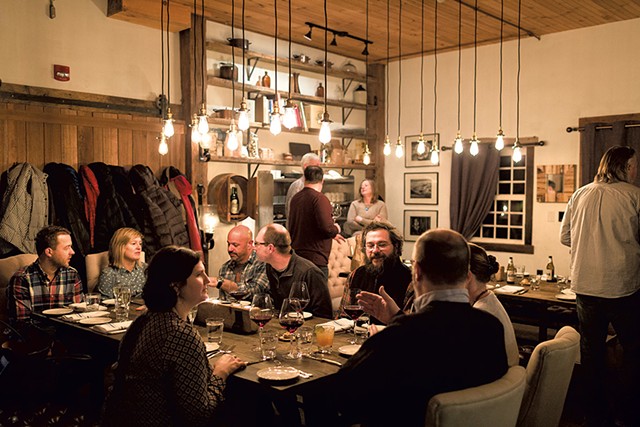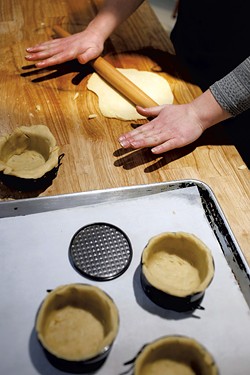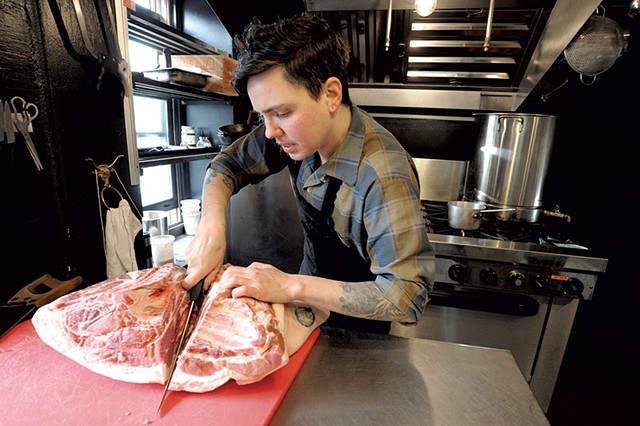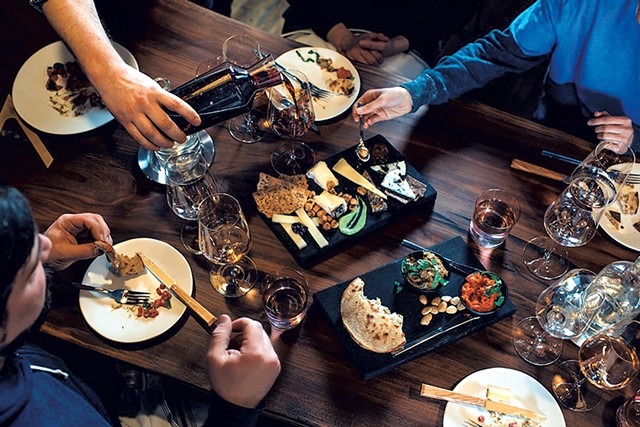Switch to the mobile version of this page.
Vermont's Independent Voice
- News
- Arts+Culture
- Home+Design
- Food
- Cannabis
- Music
- On Screen
- Events
- Jobs
- Obituaries
- Classifieds
- Personals
Browse News
Departments
-
News

UVM Cancels Commencement Speaker Amid Pro-Palestinian Protest
-
Education

Education Bill Would Speed up Secretary Search…
-
News

Middlebury College President Patton to Step Down…
- Overdose-Prevention Site Bill Advances in the Vermont Senate News 0
- 'We're Leaving': Winooski's Bargain Real Estate Attracted a Diverse Group of Residents for Years. Now They're Being Squeezed Out. Housing Crisis 0
- Aggressive Behavior, Increased Drug Use at Burlington's Downtown Library Prompt Calls for Help City 0
Browse Arts + Culture
View All
local resources
Browse Food + Drink
View All
Browse Cannabis
View All
-
Culture

'Cannasations' Podcaster Kris Brown Aims to 'Humanize'…
-
True 802

A Burlington Cannabis Shop Plans to Host…
-
Business

Judge Tosses Burlington Cannabiz Owner's Lawsuit
-
Health + Fitness

Vermont's Cannabis Nurse Hotline Answers Health Questions…
-
Business

Waterbury Couple Buy Rare Vermont Cannabis License
Browse Music
View All
Browse On Screen
Browse Events
Browse Classifieds
Browse Personals
-

If you're looking for "I Spys," dating or LTRs, this is your scene.
View Profiles
Special Reports
Pubs+More
Restaurants That Are Reshaping How We Eat Out
Published April 19, 2017 at 10:00 a.m.
In a chic, dusky wine bar in a former industrial space in Burlington's South End, servers glide around the room, pouring guests tastes of old-world vintages and funky, quirky natural selections. In the kitchen, an acclaimed chef plates savory snacks meant to showcase the wine's flavor. In a separate space beyond the bar, sales staff guide customers through the finer points of each bottle; ask, and they'll explain factors such as vineyard age and soil composition and the family histories of the wine makers.
In a former storeroom at the back of a general store in Pittsfield, Katie Stiles and Kevin Lasko host a lively dinner party for 15 to 20 paying guests three nights a week.
On Barre Street in Montpelier, Jules Guillemette and Crystal Maderia transform whole animals into steaks, chops, roasts, pâtés and terrines. Bartender Kate Wise mixes cocktails for patrons who make time to sit awhile and get to know their meat.
And, just steps from the busy rails that flank Main Street in White River Junction, Justin Barrett serves a short menu of savory pies, soups and salads to a daily lunch crowd. Patrons pour their own water and bus their own tables.
These images describe businesses that are exploring new ideas about what a restaurant is and does. Like other farm-to-table spots, they source most or all of their food from Vermont farms. But each has created service plans to help them skirt the financial and operational strains that trouble standard-format restaurants.
At Hen of the Wood, co-owner Eric Warnstedt has spoken candidly about his imperiled bottom line. "Hen of the Wood is not a sustainable business model," he told Seven Days last spring. "We're the 'popular place' in town, so people assume we're doing well. But if you want to do things 'right,' the margins just don't exist anymore."
At Vermont Fresh Network, an organization that tracks restaurant purchases from local farms, executive director Meghan Sheridan hinted that the demands of running a traditional farm-to-table restaurant were beginning to spur innovation. "We're seeing chefs try to diversify their profiles so they can make their food costs work," she said in a 2016 interview. "So, they have different kinds of restaurants."
Such eateries — like the ones described above — are finding ways to mitigate high ingredient prices, diversify their income streams and minimize labor costs, while creating formats that allow restaurateurs and chefs more creative freedom and a better lifestyle. They're embracing seasonality while ensuring that farmers, chefs and food-service workers can make a decent living doing what they love and do best.
At the same time, this wave of restaurateurs strives to satisfy what diners crave when they visit a locavore restaurant. Even at informal cafés, the food is often exquisite, and it's prepared and served with an origin story that allows guests to connect the dots between field and plate.
What's more, these new businesses are crafting intimate, deep-diving food experiences that ask customers to reengage with what they eat, how it's prepared and where it comes from. Many guests are eating up the conversation, according to early reports from restaurateurs offering different ways to dine.
In Chefs We Trust
Before moving to Vermont, Kevin Lasko was the executive chef at New York City's celebrated Park Avenue restaurant. Katie Stiles handled public relations for celebrity chefs including Alain Ducasse and Michael White. In 2014, the couple bought the Original General Store in Pittsfield and moved to southern Vermont. They run the store year-round and cater 35 to 40 lavish weddings in the summer.
When they arrived, Lasko and Stiles planned to open some kind of restaurant business during the wedding off-season, but they wanted to do something different. "We didn't want a situation where we'd be walking into a restaurant and producing a menu every day," Stiles said on a call earlier this month. Nor did they want to wait five years — the average time span most restaurants operate in the red — to turn a profit. They wanted to work with phenomenal local ingredients and provide a unique, high-quality guest experience — but only a few nights a week, when local restaurants are busy.
When the Backroom opened on Valentine's Day weekend of 2015, the couple set their supper table in a tiny room that doubles as a catering kitchen behind their store. Now, as then, on weekend evenings at about 5:30 p.m., guests enter for drinks and pre-dinner snacks. Just after 6 p.m., they sidle onto benches at two long tables, dimly lit with Edison bulbs, elbow to elbow with strangers.
During dinner, Stiles mixes cocktails from a bar inside a coat closet. She circles the room and pours wine for guests, then pauses to assist Lasko, who tends a six-burner stove at the head of the room. As the night's meal takes form — perhaps a roasted leg of lamb dusted with Mediterranean spices and served with ribboned cucumber and Greek yogurt — the duo brings food to the tables in large bowls and platters.
The guests serve themselves and, usually, each other. Each meal reflects a moment in season — the cool, wet pop of spring's early radishes, or the tangy, floral scent of fresh coriander seeds plucked in the August heat. Lasko prepares each meal with the night's guests in mind, accounting for allergies and food aversions.
It's asking something of diners to sit with strangers and submit to an unknown menu. But Backroom diners arrive ready to relinquish control. "They're OK with being surprised," Lasko said. "If they're going to try [something new], they might as well try it here, where the chef's cooking right in front of them, and they can see what's going on."
Because of the restaurant's modest scale, two people can usually manage everything alone — so labor costs are next to nothing. Granted, as Lasko noted, "The financial top line is nowhere near what it [was at Park Avenue]." But the bottom line can end up being similar, because the restaurant has less waste and can spend less on food.
In addition, the Backroom works in tandem with the couple's store and catering business: They minimize ingredient costs by buying in bulk and shuffling product from one channel to another.
"When we buy half a pig," Lasko said, "we use part of it for the store and part in the restaurant; we make bacon and use it for the weddings."
A Piece of the Pie
In White River Junction, Justin Barrett opened Piecemeal Pies in October 2016. Before that, the chef spent much of his career trying to integrate farm-to-table ideas at sit-down restaurants such as Maine's Salt Water Farm Café & Market and, before that, the Fat Radish, in New York City.
"The primary goal of a conventional restaurant is to give the customer whatever they want," Barrett told Seven Days, taking a break from service on a sunny afternoon last week.
At Piecemeal, the chef threw out the something-for-everyone format. His menu features two or three savory pies, a couple of salads, one soup and a handful of baked sweets. Aside from a few indulgences such as avocados and citrus, nearly everything comes from small local farms.
Barrett keeps price points affordable by minimizing staff and batch-preparing, freezing or preserving fresh ingredients for year-round use.
"It's how Vermonters have eaten for centuries — you put things up," he said. "That's how we can serve out-of-season fruit pies all year and feel great about it."
Buying in quantity also allows Barrett to forge partnerships with small-but-growing farms to source custom and specialty ingredients at reasonable prices.
Last year, Norwich's Hogwash Farm wanted to start raising rabbits but didn't have an outlet for the new product. "Usually, they would have to sit at the farmers market hoping to sell one [rabbit in a day]," Barrett said. "But I can say, 'I will buy all of them.'" Guaranteeing the sale means that Barrett can negotiate a lower price because he's saving the farmer the time and expense of processing the rabbits and taking them to market.
Piecemeal is open Tuesday through Saturday, from 11:30 a.m. to 6:30 p.m. — to the chagrin of customers who would like to eat there for dinner. The service team is just one café manager and one cashier/steward. Guests order from a counter and carry their own food to a table.
"It's part of getting people more involved with their food," Barrett said. "That philosophy is really important — it's the only way people are going to get such a quality product for $10. Customers have to assume some sort of responsibility in order to get that."
But, though Barrett operates with a skeleton crew and asks customers to serve themselves, he doesn't ask them to pay his workers. Piecemeal's front-of-house staff make $12 or $13 per hour instead of the usual $4 to $7 per hour plus tips. "Tipping is something that has always bothered me," the chef said. "It's a terrible, archaic situation that stems from slavery."
While service gratuities originated in Europe during feudal times, tipping took root in America in the post-emancipation era. Rather then deign to pay former slaves for food service, restaurant owners passed the buck to the customer.
"I want my café staff to get a paycheck every two weeks like a grownup," Barrett said. "I want them to know they can pay their rent."
Twelve dollars per hour is hardly a rich living, but it passes for a livable wage in the Upper Valley. When Piecemeal is busy, kitchen workers pitch in by pouring drinks, wiping tables and running the register. Tips are pooled and, at the end of the month, are divided among all employees as a bonus.
Barrett admitted that he probably works more than he should — his goal is to get "six hours of sleep at least one night a week," he said. But, of the three restaurants he's opened, he said Piecemeal has been the least stressful.
Service-Oriented
Last November, Kismet owner Crystal Maderia and butcher Jules Guillemette opened Beau Butchery + Bar at 207 Barre Street in Montpelier. Inside, a small cooler holds steaks, roasts, assorted poultry, housemade deli meats and forcemeat terrines, which Guillemette cuts daily.
Near the door, a bar invites visitors to sit for a drink or a sandwich or bowl of bone stock, with or without noodles and other accoutrements. Meat-focused cookbooks rest on a deep windowsill for customers to peruse.
Maderia and Guillemette's raison d'être was straightforward enough — Guillemette wanted to cut meat, and Montpelier had no full-service butcher counter. The duo knew they could provide the capital city with excellent meat service while supporting their community's farm economy.
But it's expensive to buy whole animals and break them down — and to recruit and cultivate meat professionals. And Beau is as much about providing knowledgeable counter service as cutting great meat. "To put all those expenses into [the meats only] would be astronomical," Maderia said.
Adding the bar allowed Beau to diversify its income stream and spread expenses across retail meats, prepared foods, beverages, classes and events. That diversity keeps prices reasonable across the board and allows Beau to pay six high-level food pros wages that are above industry standards for their nuanced customer service.
When businesses invest in workers — in training, fair wages and the freedom to explore their interests and grow professionally — workers invest themselves in the business, Maderia believes. "It's a mutually beneficial relationship," she said. She also believes that Beau patrons can sense the attention that goes into everything at the shop.
"People may not know why they feel a difference, but when they ask me, 'What makes your meat better [than what] I buy elsewhere?' I can give them a list: 'It's not frozen — here's what's happening on a cellular level...'" she said. "As soon as I start talking, people who are a little apprehensive are like, 'Oh yeah, you care. That's why it's different.'"
"I think our culture is really hungry [for service like this]," Maderia added. "We're looking for that spiritual connection. When I'm at Beau and Kismet, I'm 100 percent vested."
Operating the two businesses as stand-alone but sister enterprises allows some cross-pollination between the two. As at Pittsfield's Backroom, economies in purchasing and labor are at work here. When Guillemette negotiates a good price for a side of beef, Maderia can parcel some of it to Kismet, and both locations benefit. The partners are also standardizing some recipes across both places. Meanwhile, Beau "mirth and merriment" director Kate Wise is developing new cocktails for Kismet and training its bar staff.
Maderia notes intangible benefits, too. "My staff at Kismet can now be involved with this whole-animal butchery process, with procuring the animals," she said. "There's this very rich conversation that's giving my staff an elevated culinary experience, which they're passing on to our customers."
It's Personal
When Dedalus Wine Shop, Market & Wine Bar owner Jason Zuliani first heard about Beau, he immediately thought of the iPod. "Who wanted an iPod [before it came out]?" he wondered aloud, sitting in his Burlington office two weeks ago. "Nobody knew they wanted an iPod." While Beau's model is unexpected, "It makes a ton of sense now that they're doing it," he said. "I didn't know I wanted a butcher shop that would serve me cocktails, but now I can't wait to go down there."
Modern restaurants, said Zuliani, now succeed upon the merits of their uniqueness. He pointed to Hen of the Wood and Misery Loves Co. as other examples: "There are things that are really novel about those places." For restaurants, Zuliani said, the key question must be: "What do you compete with? What do you get people excited with?"
When Dedalus moved from Battery Street to Pine Street in February, the wine shop rolled a full-service wine bar, cheese counter and provisions under its new roof.
Though similar models exist elsewhere, the place is distinctive in Vermont. Zuliani wanted to push Vermonters to explore food and drink in ways he couldn't in a retail wine store. "We wanted to reach into culture and influence it, in a way," he said. "So, this was a natural move in that direction."
How to open people's minds to wines they'll love but haven't met yet? Talk to them. Ask them questions. The wine bar offers a venue for that conversation. It also sells bottles at retail-shop prices — without the usual 50 percent restaurant markup — to encourage guests to try new things.
"Maybe we'll take you outside your comfort zone a little bit," Zuliani said, "but maybe you'll find something that totally enthralls you." Visitors who have the best time at Dedalus, he said, "are the ones who open themselves up to it, who are willing to let us take over for a little while."
During service, that conversation extends beyond the staff-patron connection. When the restaurant opened, separate parties began sitting together at a long communal table near the door. They would geek out about the wines, discuss food and beverages, and talk about happenings in Burlington and elsewhere. And, in a move that surprised Zuliani and Dedalus staff, they started pouring glasses of wine for their neighbors.
Servers, accustomed to doing the pouring themselves, were taken aback at first. "It was like, Do we let people do that?" Zuliani said. "Of course we do. The whole intent of this place is to do it our way."
He makes a good point: When was the last time you opened a bottle of wine but offered to share it with only a few of the people at the table? "We don't do that," Zuliani said, "and this is our table."
As new American food culture embraces a melting-pot approach to dining, chefs and business owners have grown more comfortable putting their personalities on the plate. As Zuliani put it, "I think [food service] has become less about chasing somebody else's ideal and more about chasing the ideas you want to give to people."
The most successful people in restaurants today, he noted, are working in a way that's extremely personal.
Still, as with all retail and service businesses, success is measured in sales. "We don't shy away from this idea that you have to generate revenue," Zuliani said. "If you want to teach people what's great about Chenin blanc, you have to sell it to them."
Proof Is in the Pudding
So far, customers seem willing to buy Zuliani's pitch. In the 10 weeks that Dedalus has been open, the bar has drawn crowds almost every evening. Across the alley at ArtsRiot, chef George Lambertson said his dining room, too, has been "packed every night since [Dedalus] opened."
But before that, ArtsRiot's dining room had seen its own surge in business, which began when the venue ditched a fixed daily menu and let the kitchen off the chain two years ago. Turns out, diners were more interested in big-flavor, experimental cookery than in Lambertson's tasty but safe debut menu of steaks and chicken, market salads and country pâté.
At the Backroom in Pittsfield, Lasko and Stiles have added a third night of service, and most nights are booked weeks in advance. They've outsourced booking to Yelp's online reservations app to keep up with demand.
In Montpelier, Maderia is launching a series of meat-forward cooking classes at Beau, in response to constant how-to questions from butchery patrons. Wise plans to host cocktail-pairing sessions and distiller nights this summer, as well as pop-up dinners with cooks and food trucks to extend the shop's hours beyond its usual 7 p.m. closing time. Much of this innovation is possible because the butchery's open-book format invites customers to ask questions about cooking and eating in ways that aren't possible at a standard-format restaurant like Kismet.
And, in White River Junction, Piecemeal's Barrett seems grateful to have landed on a model in which he can indulge his creative vision without compromising his ethics. "I've been on the other side of this situation," he said "[where] you have to gouge customers, and you wake up every day wondering how do you still do this. At a certain point, it's like, Where do you start sacrificing your values? Do you start lying?"
Though the business is just six months old, and Barrett is still teasing out his efficiencies, he's operating within his financial "safe zone," he said. Margins are at that magical 30 percent food-costs-to-price-point ratio for which restaurants strive.
"I'm not making as much as a restaurant that gets cheap lamb from Sysco and charges a lot for a little bit," Barrett said, "but this model is allowing us to breathe. I'm watching it work."
The best way to fix a broken system, he added, "is to do your thing in a way you believe in — make your little universe as sustainable as you can." Barrett hopes that Piecemeal will inspire his workers and guests to live and eat better.
"Hopefully, my staff will go on and take this model, and someday open something [of their own] and do some good," the chef said.
Because, he added, "Isn't the goal to feed people better?"
The original print version of this article was headlined "Eating Out 2.0"
Related Locations
-
ArtsRiot
- 400 Pine St., Burlington Burlington VT 05401
- 44.46810;-73.21474
-
 802-540-0406
802-540-0406
- www.artsriot.com…
-
The Backroom
- 3963 Route 100, Original General Store, Pittsfield Rutland/Killington VT 05762
- 43.77290;-72.81337
-
 802-770-4357
802-770-4357
- www.thebackroomvt.com…
-
Beau
- 207 Barre St., Montpelier Barre/Montpelier VT 05602
- 44.25326;-72.57022
- beauvt.com…
-
Dedalus Wine Shop, Market & Wine Bar
- 388 Pine St., Burlington Burlington VT 05401
- 44.46859;-73.21425
-
 802-865-2368
802-865-2368
- dedaluswine.com…
-
Hen of the Wood (Burlington)
- 55 Cherry St., Burlington Burlington VT 05401
- 44.47910;-73.21736
-
 802-540-0534
802-540-0534
- www.henofthewood.com…
-
Kismet
- 207 Barre St., Montpelier Barre/Montpelier VT 05602
- 44.25326;-72.57021
-
 802-223-8646
802-223-8646
- www.kismetkitchens.com
-
Misery Loves Co.
- 46 Main St., Winooski Chittenden County VT 05404
- 44.49102;-73.18672
-
 802-497-3989
802-497-3989
- www.mlcvt.com
-
Original General Store
- 3963 Route 100, Pittsfield Rutland/Killington VT 05762
- 43.77290;-72.81337
-
 802-746-8888
802-746-8888
- thegeneralstore802.com…
-
Piecemeal Pies
- 5 S. Main St., White River Junction Upper Valley VT 05001
- 43.64844;-72.31887
-
 802-281-6910
802-281-6910
- www.piecemealpies.com…
Related Stories
Got something to say?
Send a letter to the editor
and we'll publish your feedback in print!
Tags: Food + Drink Features, Restaurants, farm-to-table, food experiences, Vermont Fresh Network, Eric Warnstedt, Kevin Lasko, Katie Stiles, Justin Barrett, Crystal Maderia, Jules Guillemette, Jason Zuliani, Hen of the Wood (Burlington), Original General Store, The Backroom, Piecemeal Pies, Kismet, Beau Butchery + Bar, Dedalus Wine Shop, Market & Wine Bar, Misery Loves Co., ArtsRiot, Beau
More By This Author
About The Author

Hannah Palmer Egan
Bio:
Hannah Palmer Egan was a food and drink writer at Seven Days.
Hannah Palmer Egan was a food and drink writer at Seven Days.
Speaking of...
-

Burlington: What to See, Do and Eat During the Eclipse
Jan 25, 2024 -

Crumbs: ArtsRiot Space for Lease; Jones the Boy Closes Bristol Retail Bakery; 'Seven Days' Makes Late-Night TV
Oct 18, 2023 -

A 'Sharing Shed' in West Newbury Helps Provide for All Community Members
Oct 11, 2023 -

Crumbs: Changes at Pingala, Nourish Deli and Misery Loves Co.
Aug 29, 2023 -

Emergency Eats Provides Restaurant Meals to Flood-Impacted Vermonters
Aug 10, 2023 - More »
Comments
Showing 1-1 of 1
Comments are closed.
From 2014-2020, Seven Days allowed readers to comment on all stories posted on our website. While we've appreciated the suggestions and insights, right now Seven Days is prioritizing our core mission — producing high-quality, responsible local journalism — over moderating online debates between readers.
To criticize, correct or praise our reporting, please send us a letter to the editor or send us a tip. We’ll check it out and report the results.
Online comments may return when we have better tech tools for managing them. Thanks for reading.
- 1. Burlington’s Blue Cat Steak & Wine Bar Closes After 18 Years Food News
- 2. Nunyuns Bakery & Café to Close in Burlington's Old North End Food News
- 3. Reinvented Deep City Brings Penny Cluse Café's Beloved Brunch Back to Burlington First Bite
- 4. In Montpelier, Enna to Serve Gelato; Dairy Creme for Sale Food News
- 5. Three Questions for Cory Swafford of Waterbury’s Blackback Pub Grilling the Chef
- 6. New Sheep Shop Café on a South Woodbury Homestead Gathers the Herd Food + Drink Features
- 7. La Montañuela and D’Aversa Furniture to Open Wine Bar-Showroom in Vergennes Food News
- 1. Montréal's Jewish Eateries Serve Classics From Around the World Québec Guide
- 2. Pauline's Café Closes in South Burlington After Almost Half a Century Food News
- 3. Reinvented Deep City Brings Penny Cluse Café's Beloved Brunch Back to Burlington First Bite
- 4. Small Pleasures: Monument Farms Dairy’s Chocolate Milk Inspires Devotion Small Pleasures
- 5. Ondis Serves Seasonal Fare With a Side of Community in Montpelier Food + Drink Features
- 6. New Sheep Shop Café on a South Woodbury Homestead Gathers the Herd Food + Drink Features
- 7. Standing Stone Wines Pours Affordable Flights in Winooski Drink Up














































